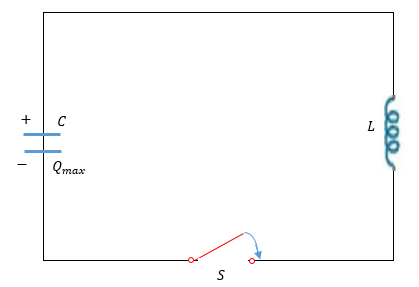Question
Question: A capacitor of capacitance \(C\) has an initial charge \({Q_0}\) and is connected to an inductor of ...
A capacitor of capacitance C has an initial charge Q0 and is connected to an inductor of inductance L as shown. At t=0 switch S is closed. The current through the inductor when energy in the capacitor is three times the energy of inductor is

A. 2LCQ0
B. LCQ0
C. LC2Q0
D. LC4Q0
Solution
Total energy of a circuit will be the sum of energy of capacitor and energy of inductor.
Formula Used: Energy of Capacitor,Uc=2Cq2
Energy of inductor,UI=21Li2
Complete step by step answer:
We know that the energy of capacitor is,Uc=2Cq2
Where,qis the charge on the capacitor
Cis the capacitance of the capacitor.
And energy on inductor is,UI=21Li2
Where, Lis the inductance and, i is the current through the inductor.
It is given that the energy of the capacitor is3times the energy of the inductor.
⇒Uc=3UI . . . (1)
Now,
since, the initial change of the circuit isQ0.
Total energyUT=2CQ02 . . . (2)
We also know that the total energy
UT=Uc+UI
⇒UT=3UI+UI from equation (1)
⇒UT=4UI.
Now substitute the valence ofUTandUI in the above equation.
⇒2CQ02=4×21Li2
⇒CQ02=4Li2
By rearranging it, we get
i2=4LCQ02
Taking square root to both the sides, we get
i2=2LCQ0
Therefore, from the above explanation the correct option is A. 2LCQ0.
Note: Capacitor is a device that stones electrical energy in electric fields.
Inductor is a device that stores energy in a magnetic field when electric current is passed through it.
Since, inductor does not have a sparkle initial change on it, the initial charge on the capacitor was the total charge of the circuit. That is why we could write,UT=2CQ02.
